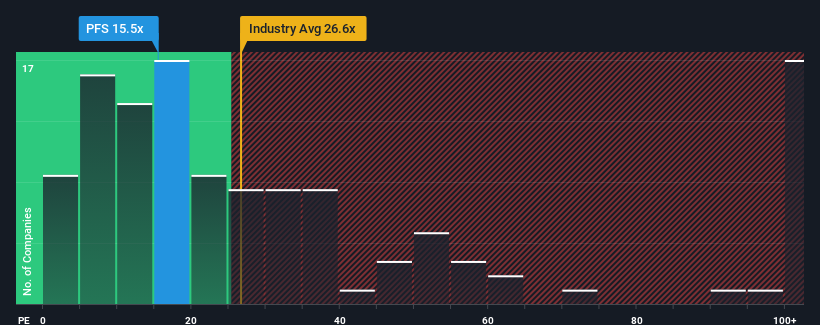- India
- /
- Diversified Financial
- /
- NSEI:PFS
Take Care Before Jumping Onto PTC India Financial Services Limited (NSE:PFS) Even Though It's 30% Cheaper

The PTC India Financial Services Limited (NSE:PFS) share price has softened a substantial 30% over the previous 30 days, handing back much of the gains the stock has made lately. Of course, over the longer-term many would still wish they owned shares as the stock's price has soared 189% in the last twelve months.
Even after such a large drop in price, PTC India Financial Services may still be sending very bullish signals at the moment with its price-to-earnings (or "P/E") ratio of 15.5x, since almost half of all companies in India have P/E ratios greater than 32x and even P/E's higher than 59x are not unusual. Although, it's not wise to just take the P/E at face value as there may be an explanation why it's so limited.
Earnings have risen firmly for PTC India Financial Services recently, which is pleasing to see. It might be that many expect the respectable earnings performance to degrade substantially, which has repressed the P/E. If you like the company, you'd be hoping this isn't the case so that you could potentially pick up some stock while it's out of favour.
See our latest analysis for PTC India Financial Services

What Are Growth Metrics Telling Us About The Low P/E?
PTC India Financial Services' P/E ratio would be typical for a company that's expected to deliver very poor growth or even falling earnings, and importantly, perform much worse than the market.
If we review the last year of earnings growth, the company posted a worthy increase of 11%. The latest three year period has also seen an excellent 113% overall rise in EPS, aided somewhat by its short-term performance. Accordingly, shareholders would have probably welcomed those medium-term rates of earnings growth.
Comparing that to the market, which is only predicted to deliver 24% growth in the next 12 months, the company's momentum is stronger based on recent medium-term annualised earnings results.
In light of this, it's peculiar that PTC India Financial Services' P/E sits below the majority of other companies. It looks like most investors are not convinced the company can maintain its recent growth rates.
The Final Word
PTC India Financial Services' P/E looks about as weak as its stock price lately. We'd say the price-to-earnings ratio's power isn't primarily as a valuation instrument but rather to gauge current investor sentiment and future expectations.
Our examination of PTC India Financial Services revealed its three-year earnings trends aren't contributing to its P/E anywhere near as much as we would have predicted, given they look better than current market expectations. There could be some major unobserved threats to earnings preventing the P/E ratio from matching this positive performance. At least price risks look to be very low if recent medium-term earnings trends continue, but investors seem to think future earnings could see a lot of volatility.
Don't forget that there may be other risks. For instance, we've identified 3 warning signs for PTC India Financial Services (1 can't be ignored) you should be aware of.
If these risks are making you reconsider your opinion on PTC India Financial Services, explore our interactive list of high quality stocks to get an idea of what else is out there.
If you're looking to trade PTC India Financial Services, open an account with the lowest-cost platform trusted by professionals, Interactive Brokers.
With clients in over 200 countries and territories, and access to 160 markets, IBKR lets you trade stocks, options, futures, forex, bonds and funds from a single integrated account.
Enjoy no hidden fees, no account minimums, and FX conversion rates as low as 0.03%, far better than what most brokers offer.
Sponsored ContentNew: Manage All Your Stock Portfolios in One Place
We've created the ultimate portfolio companion for stock investors, and it's free.
• Connect an unlimited number of Portfolios and see your total in one currency
• Be alerted to new Warning Signs or Risks via email or mobile
• Track the Fair Value of your stocks
Have feedback on this article? Concerned about the content? Get in touch with us directly. Alternatively, email editorial-team (at) simplywallst.com.
This article by Simply Wall St is general in nature. We provide commentary based on historical data and analyst forecasts only using an unbiased methodology and our articles are not intended to be financial advice. It does not constitute a recommendation to buy or sell any stock, and does not take account of your objectives, or your financial situation. We aim to bring you long-term focused analysis driven by fundamental data. Note that our analysis may not factor in the latest price-sensitive company announcements or qualitative material. Simply Wall St has no position in any stocks mentioned.
About NSEI:PFS
PTC India Financial Services
A non-banking finance company, provides various financing solutions primarily in India.
Solid track record with adequate balance sheet.
Market Insights
Community Narratives



